|
De Nederlandse dichter H.H. (Herman Hendrik) ter Balkt werd geboren in Usselo op 17 september 1938. Zie ook mijn blog van 19 september 2006 en mijn blog van 19 september 2007 en ook mijn blog van 17 september 2008 en ook mijn blog van 17 september 2009.xml:namespace prefix = o ns = "urn:schemas-microsoft-com:office:office" />
China, Juni
De dichter is maar blinde
vlier, hij kreunt en zingt
in de wind die in hem klimt
In juni bloeiden op dat plein papaver en gentiaan
(die elkaars geheime zwijgende geliefden zijn)
Demonische kweekgras-wortels mokten ...Bloemkronen
lokten duizend plukkers uit hun schaduw
Woest doemden voerlieden op in hun maaidorsers
van steen waarvan de stenen wielen ratelden; hard
snerpten zwepen in de stenen hand van de menners
die neermaaiden de papaver en de gentiaan
De dichter is maar blinde
vlier, hij zwijgt en zinkt in de wind
die aan hem wringt
Hymne aan de walnotenboom
Blijf af van de vruchten van de walnotenboom,
schud niet aan zijn takken en zijn stam,
wie zich de vruchten toeëigent, wie beslag legt,
liefdeloos, die zal het niet goed gaan.
Wie de walnotenboom pijnigt, zal omvallen.
Lang leve de walnotenboom, moge hij leven in vreugde.
Hij is de eenhuizige rijkdragende.
Hem kwaad berokkenen is er niet bij.
Het zegel beschermt hem. Het onverzwakte schild houdt stand.
Niemand steelt van de walnotenboom.
Die het wel doen die zullen zeker inslapen.
Negen kruiden beschermen de walnotenboom.
Fladder weg, ruisende spoken.
Fladder weg, dertien plagen en pijnen.
Es Yggdrasil moet wel een walnotenboom zijn.
Helder zijn in voorjaar en zomer de bladeren.
Blijf met je licht.
De tijd
De tijd is een mesjokkeme dokter.
Van kerkhofdrek druppelt zijn ketting.
Zijn jas van zwachtels en knechting
Is de vlag van 't land van de boktor.
Onder het uithangbord met de adder
Hield ie eerste spreekuur in Eden.
Een klokhuis zit sindsdien in de appel
En de ratelslang rijdt door de steden.
Vermomd als Dokter, Zandloper en Joker
Brouwt ie in zijn kolven de zwarte loper.
Doofpotten: zalfpotten met zachte zalven,
Eeuwen streek ie ze leeg aan de galgen.
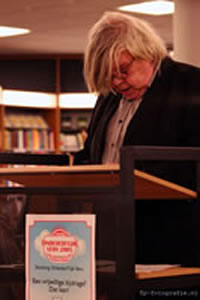
H.H. ter Balkt (Usselo, 17 september 1938)
De Amerikaanse dichter William Carlos Williams werd geboren in Rutherford (New Jersey) op 17 september 1883. Zie ook mijn blog van 18 september 2006 en ook mijn blog van 17 september 2007 en ook mijn blog van 17 september 2008 en ook mijn blog van 17 september 2009.
Children's Games
I
This is a schoolyard
crowded
with children
of all ages near a village
on a small stream
meandering by
where some boys
are swimming
bare-ass
or climbing a tree in leaf
everything
is motion
elder women are looking
after the small
fry
a play wedding a
christening
nearby one leans
hollering
into
an empty hogshead
II
Little girls
whirling their skirts about
until they stand out flat
tops pinwheels
to run in the wind with
or a toy in 3 tiers to spin
with a piece
of twine to make it go
blindman's-buff follow the
leader stilts
high and low tipcat jacks
bowls hanging by the knees
standing on your head
run the gauntlet
a dozen on their backs
feet together kicking
through which a boy must pass
roll the hoop or a
construction
made of bricks
some mason has abandoned
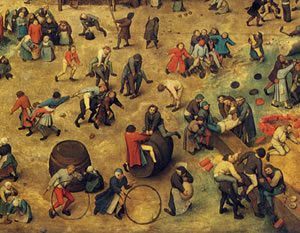
Brueghel, Kinderspelen (detail), ca. 1560
III
The desperate toys
of children
their
imagination equilibrium
and rocks
which are to be
found
everywhere
and games to drag
the other down
blindfold
to make use of
a swinging
weight
with which
at random
to bash in the
heads about
them
Brueghel saw it all
and with his grim
humor faithfully
recorded
it.
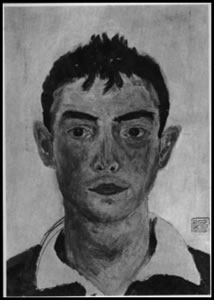
William Carlos Williams (17 september 1883 - 4 maart 1963)
Zelfportret, 1914
De Amerikaanse schrijver Ken Kesey werd geboren in La Junta (Colorado) op 17 september 1935. Zie ook mijn blog van 17 september 2008 en ook mijn blog van 17 september 2009.
Uit: One Flew Over the Cuckoo's Nest
Ten-thirty Public Relation comes in with a ladies' club following him. He claps his fat hands at the day-room door. "Oh, hello, guys; stiff lip, stiff lip
Look around, girls; isn't it so clean, so bright? This is Miss Ratched. I chose this ward because it's her ward. She's, girls, just like a mother. Not that I mean age, but you girls understand
"
Public Relation's shirt collar is so tight it bloats his face up when he laughs, and he's laughing most of the time I don't ever know what at, laughing high and fast like he wishes he could stop but can't do it. And his face bloated up red and round as a balloon with a face painted on it. He got no hair on his face and none on his head to speak of; it looks like he glued some on once but it kept slipping off and getting in his cuffs and his shirt pocket and down his collar. Maybe that's why he keeps his collar so tight, to keep the little pieces of hair out.
Maybe that's why he laughs so much, because he isn't able to keep all the pieces out.
He conducts these tours serious women in blazer jackets, nodding to him as he points out how much things have improved over the years. He points out the TV, the big leather chairs, the sanitary drinking fountains; then they all go have coffee in the Nurses' Station. Sometimes he'll be by himself and just stand in the middle of the day room and clap his hands (you can hear they are wet), clap them two or three times till they stick, then hold them prayerlike together under one of his chins and start spinning. Spin round and around there in the middle of the floor, looking wild and frantic at the TV, the new pictures on the walls, the drinking fountain. And laughing. What he sees that's so funny he don't ever let us in on, and the only thing I can see funny is him spinning round and around out there like a rubber toy if you push him over he's weighted on the bottom and straightaway rocks back upright, goes to spinning again. He never, never looks at the men's faces
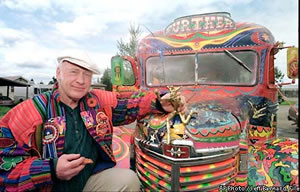
Ken Kesey (17 september 1935 10 november 2001)
De Nederlandse toneel- en kroniekschrijver en essayist Abel Herzberg werd geboren in Amsterdam op 17 september 1893. Zie ook mijn blog van 17 september 2008 en ook mijn blog van 17 september 2009.
Uit: Amor fati (Vertaald door Jack Santcross,)
The last train
On 8 April 1945, five or six empty trains, each some fifty wagons long, were standing in the station of the small town of Belsen on Luneburg Heath. The station consisted only of a number of platforms, three or four parallel to one another, and a couple more adjoining at an angle. There was no sign of any station building or waiting room. There was also no ticket office or ticket barrier. None of those was needed. The station was the loading and unloading point for the inhabitants of the extensive neighbouring barracks and the series of camps which, by means of the many side roads leading off the main road, and barred by one barrier after another, one barbed wire fence after another, and flanked by all kinds of watchtowers, were accessible only to the chosen. The chosen were prisoners of war, political prisoners, and Jews. None of us knew how many people were concentrated there.
Taking all the different groups and sections together, it may have been a hundred thousand.
When a German tells you that he knew nothing of the camps or of the conditions that prevailed there, he may not be lying. However, it does not exonerate him. The question is, whether he could and should have known. Whatever, the S.S. liked secrecy. Perhaps because it instils greater fear than openness does. To let a nation guess and suspect that somewhere, something terrible is happening is perhaps a more effective means for a police state to rule by than to tell it the truth.
Something else may have played a part as well. When a cat has caught something tasty, it drags it to a corner where it can feast in secret. That, more or less, is how the S.S. dragged its prey to a secret place where it feasted behind closed doors.
The trains on the so-called station of Bergen-Belsen consisted partly of coal wagons. A few were covered with a kind of improvised, tattered tarpaulin. Most were open. When the Russians began to push forward in Poland, prisoners were transported in these wagons for days and nights on end, for weeks on end, through rain, snow, frost, and storm, often without food or water, from east to west. The
Germans abandoned everything, except their prey.
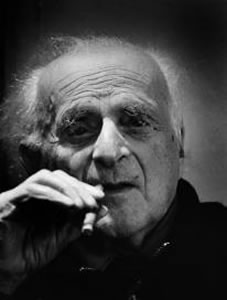
Abel Herzberg (17 september 1893 - Amsterdam, 19 mei 1989)
Zie voor nog meer schrijvers van de 17e september ook mijn vorige blog van vandaag.
|



